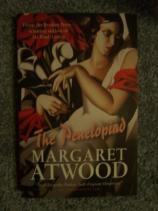The Penelopiad: The Myth of Penelope and Odysseus
Review
The Penelopiad: The Myth of Penelope and Odysseus
This year Canongate Books, along with two-dozen other international
publishing houses, is launching an ambitious, multi-year myths
project. Featuring renowned authors such as Jeanette Winterson,
Chinua Achebe, A. S. Byatt, Donna Tartt, and many more, the series
aims to retell classic myths in inventive, sometimes startling, new
ways, to reawaken these great stories for a modern audience.
One of the first entries in this impressive undertaking is THE
PENELOPIAD by Margaret Atwood. And what a splendid introduction to
the project it is. Almost everyone knows the story of Odysseus, the
warrior and king of Ithaca who fought in the Trojan War and then
took a really, really, really long time to get back home. It's easy
to forget about his wife Penelope, who (if you'll recall) was
always best known for her modesty, her patience, and her virtue.
She was also known for being clever, for (according to Homer's
ODYSSEY) she spent her days weaving and her nights unraveling, in
order that she might never have to finish her project and marry one
of the numerous suitors who surrounded her in Odysseus's
absence.
But Atwood, well known not only as a novelist and poet but also as
a feminist writer, was not satisfied with this portrayal of
Penelope. Nor could she stop thinking about the disturbing scene in
THE ODYSSEY in which Penelope's son Telemachus hangs Penelope's
twelve handmaidens for sleeping with the suitors. Atwood's
retelling, then, shows us a very different side of the story.
The narrative is presented by Penelope herself, from the fields of
Hades. Penelope has been dead for eons, and she tells her story for
a modern audience. Through her retelling, we discover much more
about Penelope's childhood (much of which Atwood reconstructed from
other mythic accounts), her jealousy of her cousin Helen's beauty,
her loathing of life in Ithaca, and her combined love and
resentment of her husband. We also learn that Penelope herself is
haunted by the gruesome murder of her twelve youngest, most
beautiful handmaidens --- most of whom had been raped by Penelope's
greedy suitors --- at the hands of Odysseus and Telemachus.
Penelope is accompanied by a chorus of the dead maids themselves,
inspired by the choruses of Greek drama. Although their satirical
commentaries sometimes rely on groan-inducing puns ("kiddie
mourn"), their voices also have a poignancy that will speak to
modern readers, particularly as their story unfolds in Penelope's
narrative.
Although Atwood's brief novel can appeal to readers regardless of
their familiarity with Homer's more familiar tale, the two versions
do enrich each other in any number of ways. Atwood's sensitive and
humane portrayal of Penelope will inspire many readers to return to
Homer's ODYSSEY with a more appreciative, but also more critical,
eye.
Reviewed by Norah Piehl on January 14, 2011











